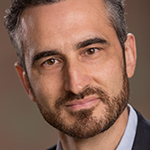Congratulations to UBC Department of Medicine members who have been awarded 2022 Michael Smith Health Research BC Reach Award & Convening & Collaborating (C2) Program Awards.
MSHRBC Reach Program provides funding for teams of researchers and research users to support the dissemination and effective uptake of research evidence.
MSHRBC’s Convening & Collaborating (C2) Program is designed to build capacity for the development and use of research evidence in practice, policy and further research by promoting knowledge exchange between health researchers and research users.
In 2022, the MSHRBC C2 and Reach award recipients and project leads from the UBC department of medicine are:

Dr. Liam Brunham (division of general internal medicine):
Reach Project (Principle Investigator): Familial hypercholesterolemia patient engagement forum: Family care and women’s health
Familial Hypercholesterolemia (FH) is the most common inherited disorder, with a prevalence of 1 in 250 Canadians, characterized by lifelong elevation in blood cholesterol leading up to 22-fold increased risk for heart disease. Despite this, in BC alone, more than 85 percent of cases are undiagnosed and only a minority receive appropriate treatment. A key component for improving care for this population is by increasing awareness through patient education, engagement and dissemination of recent FH research results. The purpose of this proposal is to organize an updated educational forum on FH, focusing specifically on family-based care and women’s health, including lectures by patients, physicians, dietitians and genetic counsellors, and interactive group sessions including patients’ testimonials. This forum will provide an opportunity for patients to learn about new developments in diagnosis and treatment of FH, including management in special populations, such as pregnant women and children. The goal is to empower patients to become advocates for the FH community by increasing awareness of the disease and recognizing the importance of screening their families for early identification, treatment and ultimately heart disease reduction.

Dr. David Patrick (division of infectious diseases):
C2 Project (Principle Investigator): Tailoring antibiotic audit and feedback according to dentists’ needs
Twelve percent of all dental antibiotic prescriptions in BC are for clindamycin, a drug with considerable risk of adverse effects compared with alternatives. Good dental outcomes are achieved with much lower use of that drug in Australia (5 percent), and the UK (0.5 percent). Prescribing clindamycin endangers patient safety due to higher rates of Clostridium difficile infections, increases the risk of resistance, and should only be used when no better option is available. Audit and feedback interventions have decreased antibiotic prescribing rates in various settings, but experience with its use in dental prescribing is limited. Further, there is growing evidence that strategies informed by behavioral theory may be more effective and should be explored. Focus groups will provide an understanding of the current challenges in dental prescribing and test the responses on audit and feedback as well as the planned and alternative behavioral interventions. This would enable tailoring the audit and feedback according to the dentists’ needs making the intervention more relevant to the receivers and more effective

Dr. Stephen Chia (division of medical oncology):
C2 Project (Co-Lead): Developing a collaborative research agenda to improve the care of patients living with metastatic breast cancer in British Columbia
Metastatic breast cancer (MBC) affects up to 30 percent of women with early breast cancer and represents up to 10 percent of new breast cancer diagnoses. It is one of the most common causes of death from cancer amongst females. The availability of new treatments has improved survival; however, the treatments are very toxic. There is a trade-off between managing treatment toxicity for these patients, in terms of extending survival and maintaining a decent quality of life. Constant treatment and monitoring are required; this results in a burden at the patient and at the health systems levels. Through a series of virtual meetings, we will bring together front-line cancer care providers, academic researchers, and patients and families to reflect and share their experiences about the MBC care in BC. The meetings will aim to discuss the facilitators and barriers to accessing specialized MBC care. Our goal is to establish partnerships, encourage knowledge exchange, and develop a collaborative research agenda to ensure quality care for individuals living with MBC in BC.